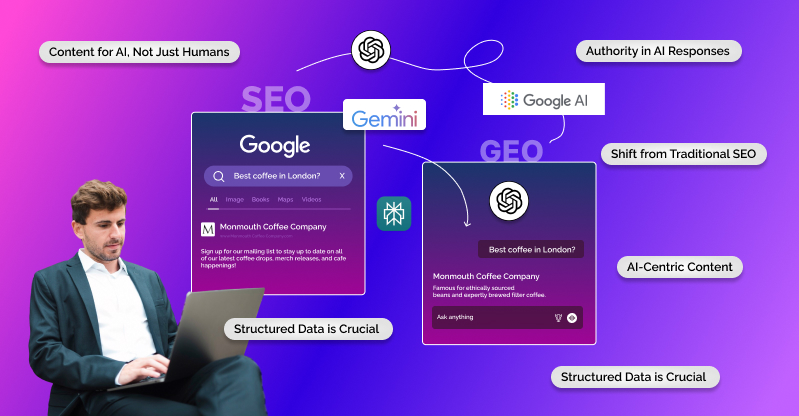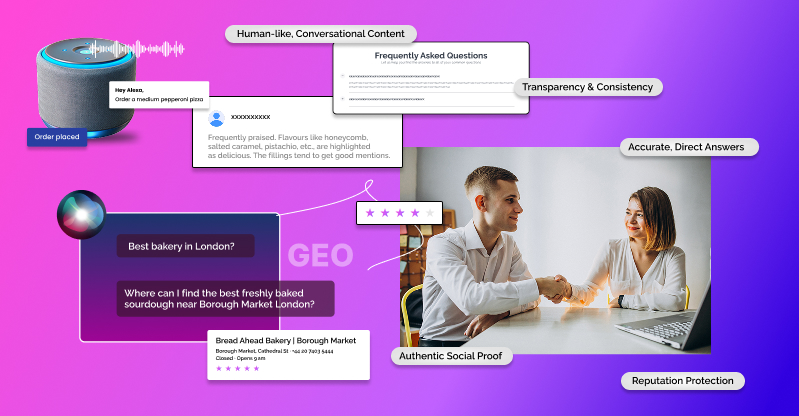How Generative Engine Optimisation is Revolutionising SEO in the UK

Table of Contents
The UK search environment is changing. Only the traditional SEO, which is once link- and keyword-ranking-focused, is no longer sufficient to guarantee visibility.
Instead, we need to add search engines and AI-based generative algorithms, which can transform the way individuals search and interact with content.
Generative Engine Optimisation (GEO) is spearheading this revolution. It’s moving beyond web searching and desires your content to be discoverable, understandable, and recommended on AI-driven platforms like ChatGPT, Google’s Search Generative Experience (SGE), and Microsoft’s Bing AI.
For UK companies, it is not a trend but an imperative of competition. Consumers increasingly seek AI-driven engines to deliver personal, conversational, and contextual answers, not sluggish lists of links. SEOs that peak at GEO will get attention, trust, and more engagement in this age of AI.
In this blog, we’ll dive into what GEO is, how it differs from traditional SEO, why it’s vital for UK businesses, and the strategies needed to thrive in this new search environment.
What is Generative Engine Optimisation (GEO)?
Generative Engine Optimisation is the science of optimising content to be easily found, put in context, and retrieved by artificial intelligence-powered generative engines.
While SEO targets having search engines display links, GEO ensures that content is properly formatted and authoritative enough to be quoted, referenced, or paraphrased by AI systems providing direct answers.
In essence, GEO is about making your brand AI-ready so that it is part of the answers presented by conversational systems.
Key Differences Between SEO and GEO
|
Attribute |
SEO (Search Engine Optimisation) |
GEO (Generative Engine Optimisation) |
|
Focus |
Webpage ranking based on keywords, backlinks, and authority |
Being included in AI-generated answers and summaries |
|
Strategy |
Keyword-focused, link-building, and metadata |
Context optimisation, semantics, and structured data |
|
User Experience |
Users click links on SERPs to obtain answers |
Users receive AI-delivered answers directly, often without clicking |
| Goal | Generate traffic through SERP listings |
Position the brand as a trusted source in AI-generated answers |
Why GEO Matters to UK Businesses
UK shoppers are adopting generative search faster than expected. With the advent of SGE from Google, Bing AI release from Microsoft, and search engine browsers like ChatGPT merging browsing, businesses have to reconsider how they show up in search.
The following are the reasons why GEO is important to the UK market:
1. AI-Powered Search Experiences
Generative AI engines abstract content; therefore, unless your content is context-optimised, it will not show up in the answers that people view.
2. Lesser Click-Through Dependence
Customers more and more relying on AI abstracts rather than a couple of clicks. GEO maintains your business cited, branding you.
3. Early Take-Up Competitive Advantage
There are still numerous UK companies solely focusing on SEO. As a pioneer adoption of GEO, you have the head start over your competitors.
4. Credibility and Trust
Well-informed and authoritative content is what AI prefers and makes it credible. Therefore, if brands can pay attention to GEO, they can develop consumer trust quicker.
Effective GEO Core Strategies
To successfully use GEO, UK companies need to resolve the following first:
Understand Generative Search Behaviour
In contrast to keyword search, users perform question-like, long-tail searches. For instance:
“What’s the best way for a UK startup to raise funds in 2025?”
GEO optimisation using natural, question-like language boosts discoverability.
Semantic and Structured Content
Make use of schema markup, FAQs, and meaning-full paragraphs so AI can get meaning fast. GEO thrives on quality content that AI can “read” and reuse.
Create Authoritative and Niche Content
Expertise comes first with generative engines. Citing government reports, official UK statistics, or industry studies makes AI believe and position your content first.
Optimise for Voice and Conversational AI
Similar to AEO, GEO needs to replicate natural speech. Voice assistants with built-in AI engines (Alexa, Google Assistant) are emerging as the new entry point to answers.
Embed Multimedia Content
AI use cases increasingly draw on not only text but also videos, podcasts, and infographics. Making them optimised with transcripts and metadata boosts your contribution to AI summaries.

Measuring the Effect of GEO
GEO success, unlike common SEO metrics, is measured by how often your brand is referred and recommended by answers generated by AI. Some of the most crucial indicators include:
Brand Mentions in AI Responses
Track how frequently your business name, goods, or services are mentioned on AI platforms like ChatGPT or Google SGE.
Visibility in Summarised Content
Track how often your content appears in AI summaries and not SERP rankings.
Engagement Metrics
See how users react after having engaged with your brand in AI results—newsletter sign-ups, demo requests, or conversions.
Long-Tail and Conversational Keyword Rankings
Rankings for natural search with queries get better, which means your GEO initiatives are mirroring generative search patterns.
Authority Recognition
References or citations by AI-powered citations to your original work mean engines rely on your capability.
UK Search Visibility Future
Search in the UK will revolutionise in the future through Generative Engine Optimisation. What to anticipate is this:
Answers-First Ecosystem
Links will be secondary, with answers generated by AI engines being the norm.
AI-Driven Personalisation
Generative search will personalise answers to user intent, preferences, and context, so businesses will have to focus on hyper-personalised content.

Localisation for UK Customers
Local GEO strategies, including postcode targeting, UK-centric datasets, and region-based content, will be a necessity.
Omnichannel Integration
GEO will be married hand-in-hand to paid search, social media, and email to ensure the brand message is consistent across channels.
Constant Evolution
The technologies are continuing to evolve, and so will business. With the constant updates, fresh authoritative content, and monitoring generative search trends, you will achieve long-term success.
Conclusion
Generative Engine Optimisation is no longer optional—it’s the future of search. For British consumers who demand rapid, context-aware, and AI-based responses, GEO is the solution to staying seen and in the game.
Businesses embracing structured, authoritative, and conversational content will not merely hold on but prosper in this AI-led age of search.
It’s time UK companies invest in GEO, putting their brand into the AI-generated answers that depend on millions of users daily. Consult with a digital marketing expert to make your brand visible with AI expertise.
FAQs
 How is GEO different from SEO?
How is GEO different from SEO?
SEO is rankings and backlinks, but GEO makes your brand seen and cited in AI-generated answers.
 Why should UK businesses care about GEO?
Why should UK businesses care about GEO?
As UK users increasingly depend on AI-provided responses, companies must optimise for GEO in order to remain visible and competitive.
 What will be the best content to use in GEO?
What will be the best content to use in GEO?
High-quality, natural language content augmented by FAQs, data modelling, and UK-authenticated references works best.
 How do I measure success in GEO?
How do I measure success in GEO?
As AI mentions are tracked, content is viewed in summaries, and engagement signals like clicks, conversions, and authority signals.
 Are small UK businesses able to use GEO?
Are small UK businesses able to use GEO?
Yes. GEO levels the playing field, making sure even small businesses are visible on AI-generated search listings.



